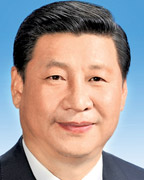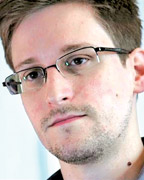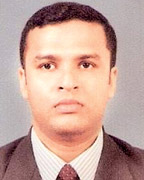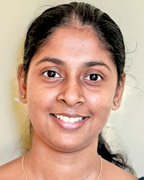Follow information security practices
by Dulmin Samarasinghe

Chinese President Xi Jinping |
 |
| Edward Snowden |

European Commission Vice President Neelie Kroes |

Brazillian President Dilma Rousseff |

Roshan Chandraguptha |

Dinithi Jayasekera |
The internet has become an indispensable tool. People use it to get
information, education, entertainment and for convenience such as on
line transactions. Governments and companies use it to disseminate
information, to conduct business and to make available their services to
the public. According to the inventor of the internet Sir Tim
Berners-Lee nobody would have thought the huge role it would play at
present, 25 years ago.
The massive impact created by the internet has positive and negative
sides. It has made people vulnerable due to social media. The
governments have used it to surveillance programs raising serious
questions about the intentions of such programs, as revealed by the
United States (US) defence contractor Edward Snowden.
The advent of cyber espionage and cyber crime, have made people,
governments and businesses weary of using the internet. Although experts
tell the people to be careful when giving their personal information,
they seem not to follow simple guidelines such as adjusting privacy
settings. The fact is that the internet has become a part and parcel of
life at present and its popularity is growing despite the dangers it
poses to individuals, governments and businesses.
People should protect information by adjusting privacy settings on
email and social media accounts to get maximum benefits and to avoid
problems, said Senior Information Security Engineer of the Sri Lanka
Computer Emergency Readiness Team (CERT) Roshan Chandraguptha. "Sri
Lanka cannot lag behind in using technology but should take precautions
to avoid pitfalls associated with using the internet", he said.
The correct and ethical use of internet is the need to get all its
benefits.
Chandraguptha said that several businessmen lost their money and
goods due to "Phishing" accounts where they had not taken care to verify
by means of a telephone call or by another way, when their passwords and
user names were asked by such accounts. People should take extreme care
to check the email address and be cautious if asked to send cash to a
different on line account, as it could be a fraud.
CERT has been operating under the Ministry of Telecommunication and
Information Communication Technology (ICT). It protects ICT assets of
the government, businesses and provides technical assistance to the
public. It educates and advises parents and the public on adjusting
privacy settings on social media and email accounts to make them safe.
Most of the countries now have CERT and Sri Lanka's CERT, corporate,
assist and share information with them. Chandraguptha said that they
were recognised by major IT companies, social media including face book
and they could seek assistance on behalf of the public.
Lecturer, Department of Mass Communication, University of Kelaniya
Dinithi Jayasekara said that Internet is needed at present for any type
of work. Since it has no borders its usefulness is more. There are
positive aspects to it such as on line transactions while negative
features such as frauds, committed on line.
She said that internet is very useful for education and e-learning
continue to increase. Internet is also used for entertainment which is
needed for a wholesome lifestyle. People should be educated not to use
Internet to activities such as abuse and cyber bullying. Web sites on
internet cannot be blocked as people will find ways to access it. The
future will be a digital world led by technology. It is impossible to
live without technology and people have to take responsibility when they
use it.
The young generation use Internet for education, information,
entertainment and social interaction. According to her research in
Kelaniya, Jayawardenapura and Colombo universities, 42% of the
undergraduates use the popular social networking site face book (FB).
Among them 83% claimed they created their own accounts. Most of the time
they have searched for friends on line and 6% has used it for
businesses.
Although 58% have spent less than one hour on FB 14% have spent more
than 2 hours which is considered wastage. She said that 21% have
accepted friend requests from unknown people risking their privacy.
When asked why they accepted such requests they had said that they
wanted to increase the number of friends without realising the
consequences they have to face later. This shows that even educated
youth needs guidance to use the Internet. Chinese President Xi Jinping
has called for his country to become a cyber power, the media reported
recently, after he chaired a meeting of a special group focused on
Internet security.
"We should be fully aware of the importance and urgency of Internet
security and information", he said. At the meeting Xi emphasised that
Internet security is a key strategic and security issue for China,
Xinhua reported.
Xi's call comes as the question of large scale cyber espionage has
become a key point of contention for China and United States. Beijing
has also cited leaks by former American intelligence contractor Edward
Snowden revealing mass US electronic surveillance programs as evidence
that the US is guilty of double standards when it comes to online
espionage.
Brazilian President Dilma Rousseff welcomed recently a German
proposal to create a network to rival that of the US National Security
Agency (NSA). She said that she shares the concerns expressed by German
Chancellor Angela Merkel who recently called to set up a European
communications network to rival the US's NSA. Rousseff said privacy,
human rights and the sovereignty of the nations have to be respected.
Global mass surveillance conducted by the US and other governments
destroying the future of internet, Edward Snowden told a packed
auditorium of technology innovators via video link. He urged internet
and computing experts to design and produce encrypted communication
technology that the average user can use. Talking about internet
security and calling it "defence against dark arts in the digital
realm", he said the systems available, if used by the general public,
would make National Security Agency's (NSA) bulk surveillance programs
much more difficult.
Billions of people around the world do not trust the internet, claims
European Commission vice president Neelie Kroes.
Recalling the German Chancellor Angela Merkel's phone hacking
incident, she said it was clear that the trust was now missing. Speaking
at the Cebit technology fair in Hanover, she said the future of the
internet was based on trust.
Referring to Mrs. Merkel's calls for a secure European Communication
Network, Ms. Kroes said protections needed to be tightened if it was to
work.
Europeans citizens should have the right to decide where there data
goes, she said. The European Commission already has proposals in place
for data protection directive that requires companies and government's
to take responsibility for data, she said.
Automation of critical infrastructure and control systems will make
lives more comfortable while exposing to threats. By following good
information security practices, threats could be minimized and benefits
could be enhanced. Sri Lanka needs to keep developing its IT
infrastructure to be on par with developed countries. |

